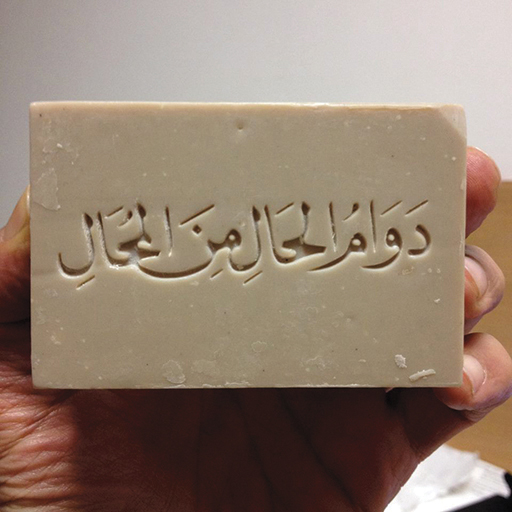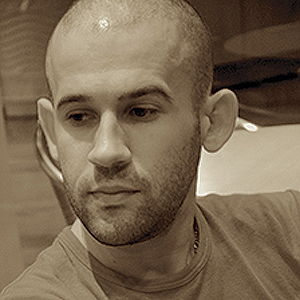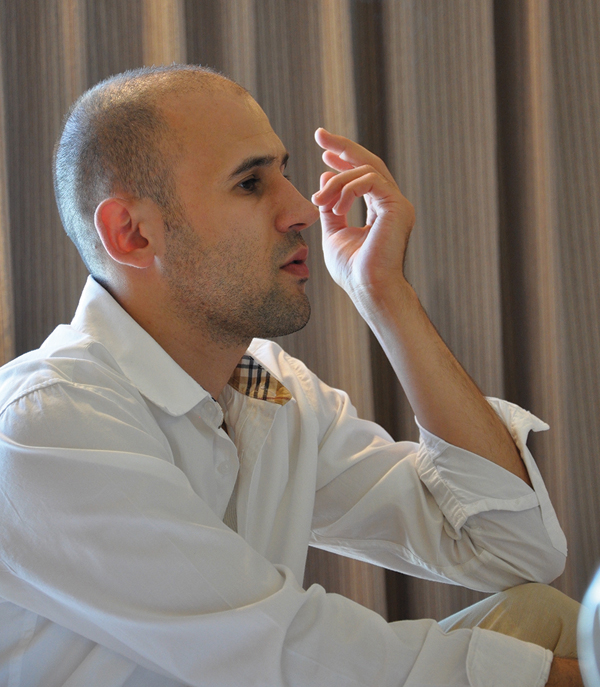Tarik Hamdan, born in 1984, is a poet and media person who in 2011 published his first poetry co Once When I Was a Sperm llection titled Once When I Was a Sperm. It has been translated into Korean, Spanish, French, and Dutch. Hamdan lives in Paris, and in addition to being engaged in musical activities, he is editor-in-chief of Filistin Ashabab (Palestinian Youth) magazine and a literary and art critic with several newspapers and magazines, among them France Médias Monde and Radio Monte Carlo. His second collection of poetry will be published in French and Arabic in June 2017.
Visual artist Monther Jawabreh notes that, in the collection Once When I Was a Sperm, Hamdan calls for the breaking down of cultural rigidity and parental authority, refusing false idealism. “Hamdan immerses himself in existential matters, searching for and questioning human facts and intricacies that are dying every day. He proposes an alternative behavioral order that challenges existing classical language, poetry, art, and music. The complex narrative of the poems, told in a mix of colloquial and classical language, reflects the self-contradiction in which we live. Hamdan’s poems confront the existing norms and taboos with doubts, refusals, and candidness, creating an inquisitive debate between nothingness and total rejection. Hamdan’s anxiety leads to serious reflection and proposes hard questions to a tired universe regardless of whether such questions have answers.”
Writer and critic Nadine Bakhus points out that whereas complex personalities with pessimistic views on life are a trait of our humanity-bereft modern time, one must imagine the state of creative artists who belong to a people that was dispossessed of its land over 60 years ago. She notes that Hamdan’s poem focuses on two main themes: “time, which does not stop and during which more people die; and life, which is full of problems. Both issues are intertwined and contradict each other. Hamdan fears the passing of time and the ending of life, while at the same time wishing that life did not exist in the first place.”
Translated from Arabic by Sani Meo.
Once When I Was a Sperm
I was the strongest
The fastest
One day.
I overcame an army of my brothers
Not even an IUD could stop me
One day, I thought it was worth it
But didn’t know
That God’s path
Is full of thorns and dynamites
And eclampsia.
I would have owed you a lot
If you had tossed me in the toilet.
I would have owed you a lot
If you had kept me undisturbed.
I was the strongest
One day when I was a sperm
Now, undoubtedly I have realized
That you win one day, and lose the rest.

Promises
We promise
To draw you as a risible sun
We promise
To whisper in the ears of the rest
How good-, warm-hearted
You are
We promise
To walk on our toes,
Not to talk at all of things
That might matter
We promise
To be as patient as camels
As enduring as donkeys
And as forgetful as cats
That don’t recall anything.
Just let us
Go through
Quietly, tranquilly.
Let us
Go through
Quietly.
Let us,
World.
From the poetry collection Once When I Was a Sperm.
Translated by Ahmad Zatari.



